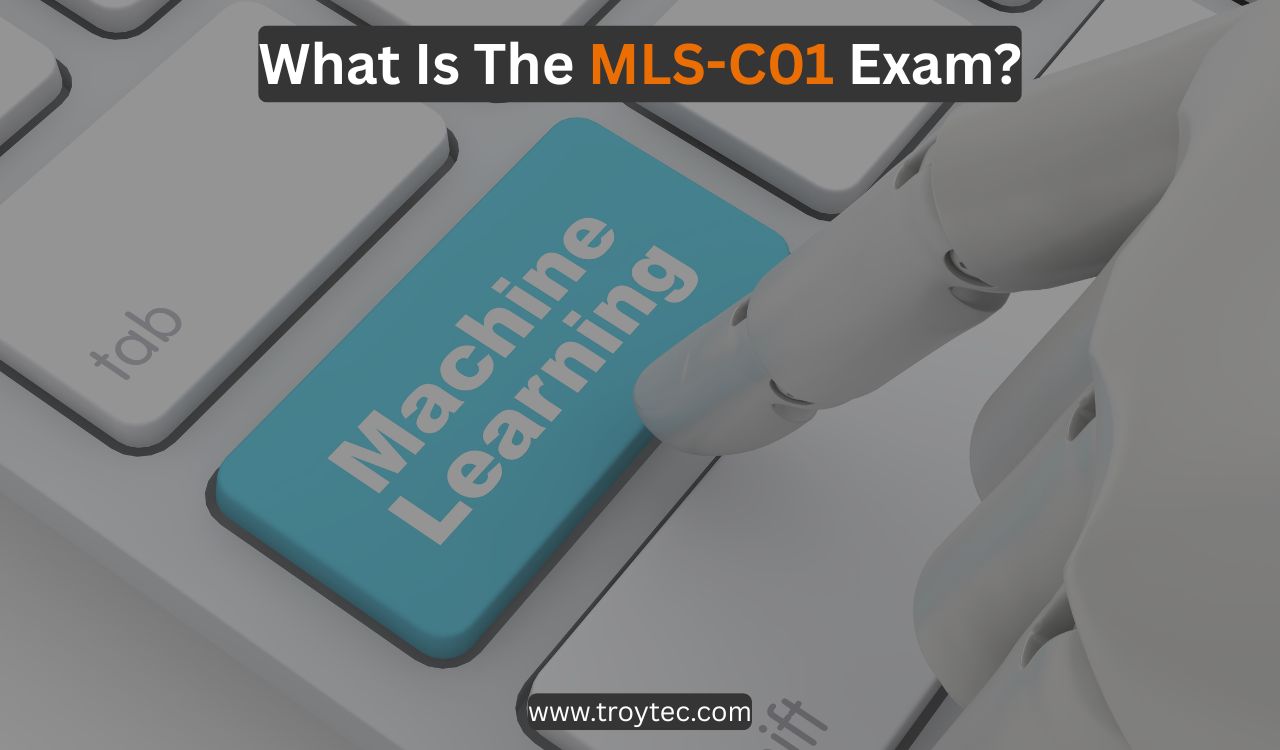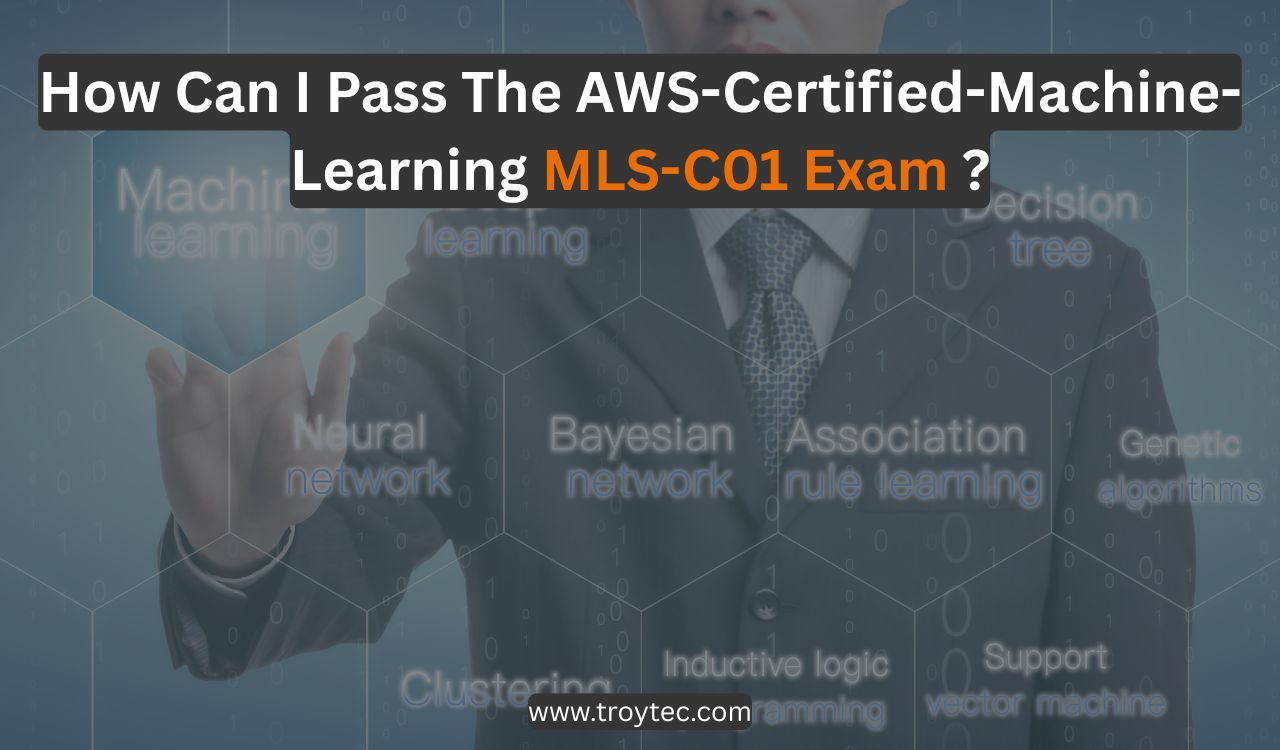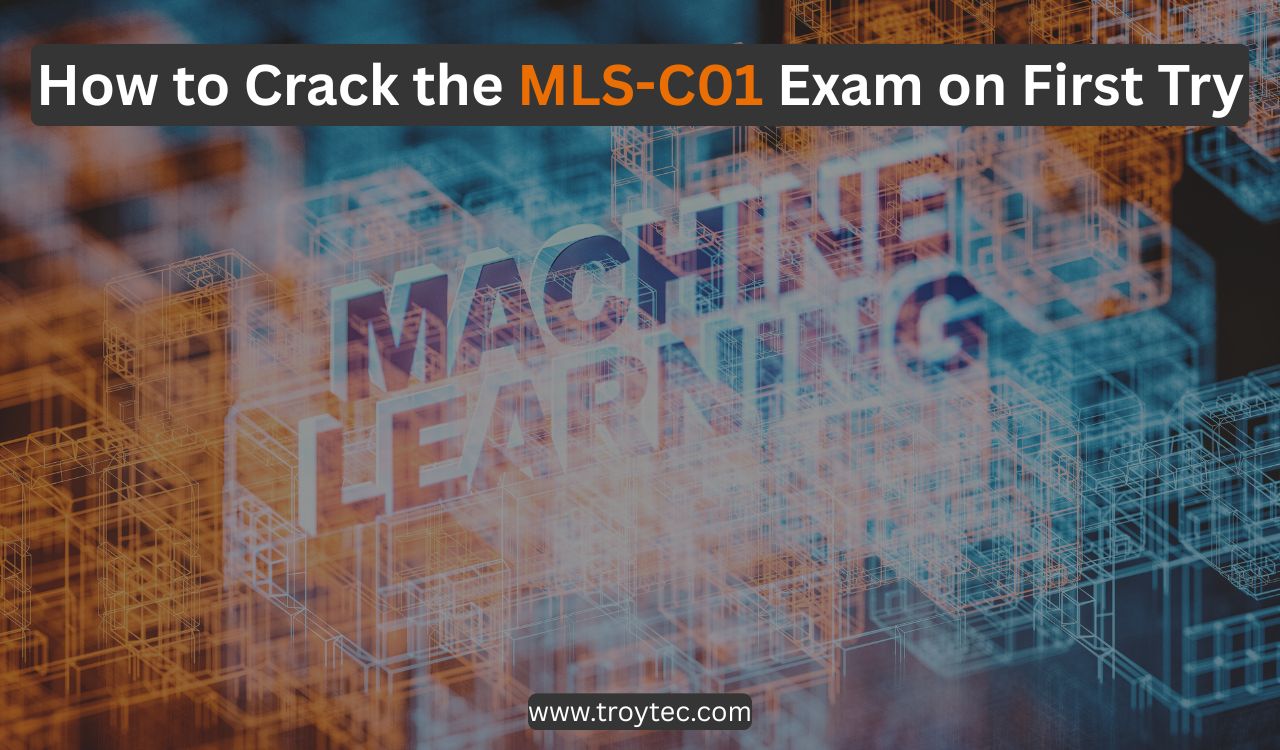Among the most valued and difficult certificates in IT are those for AWS. Each is tough, but ML Specialty has its “special sauce.” It assesses your conceptual knowledge of machine learning, statistics, and probability as well as your familiarity with AWS. One well-known machine learning certification is the AWS-Certified-Machine-Learning MLS-C01 Exam.
Our goal is to assist you in passing the AWS MLS-C01 exam. With the help of our online preparation platform, which offers MLS-C01 practice exams, you can effortlessly pass the AWS Certified Machine Learning-Specialty—based on their more than ten years of experience in the specialty domain and their knowledge of AWS technology, our team of professionals created this practice test.
Similar to the real AWS-Certified-Machine-Learning-Specialty MLS-C01 exam, we have meticulously preserved the weights of the Machine Learning Specialty curriculum subjects, exam structure, timed exam environment, and scoring system. Since these kinds of questions are the most common in the real MLS-C01 exam, our specialists have incorporated them into the AWS-Certified-Machine-Learning-Specialty MLS-C01 exam dumps.
Keep reading and exploring to learn how you can pass the AWS certified specialty MLS-C01 exam on your very first try in 2025.
What is Machine Learning?

Before we get into our main topic of MLS-C01, it is necessary to discuss what is machine learning first.
The goal of the artificial intelligence (AI) subfield of machine learning (ML) is to create algorithms that let computers learn from data without the need for explicit programming. By analyzing data and searching patterns, machine learning (ML) essentially allows computers to improve their performance on a given activity gradually.
Machine learning algorithms are competent to identify patterns and correlations in data. These algorithms may decrease dimensionality, cluster data points, categorize information, make predictions, and even create new content when given historical data as input. GitHub Copilot, Claude from Anthropic, and ChatGPT from OpenAI are a few instances of the latter, sometimes referred to as generative AI.
Though machine learning (ML) is a strong tool for problem-solving, improving company processes, and automating jobs, it is also complex and resource-intensive, necessitating significant infrastructure, data, and specialized knowledge. One must have a good understanding of mathematics and statistics to pick the right algorithm for a project.
Large amounts of high-quality data are frequently required for ML algorithm training to produce consistent results. It can be difficult to understand the findings themselves, especially when they originate from complex algorithms such as deep neural networks. Furthermore, operating and fine-tuning ML models may be costly.
What Is The MLS-C01 Exam?
The ability of a candidate to develop, implement, deploy, and oversee machine learning solutions for particular business challenges is evaluated by the AWS-Certified-Machine-Learning MLS-C01 exam. It will assess the applicant’s capacity to:
- Determine and defend the optimal machine learning approach for a given business problem.
- Determine which AWS services are appropriate for ML solutions.
- Develop ML systems that are scalable, affordable, reliable, and secure.
For individuals who wish to showcase their machine learning (ML) abilities on the Amazon Web Services (AWS) platform, the AWS-Certified-Machine-Learning-Specialty MLS-C01 exam is a well-liked credential. The candidate’s ability to design, develop, and oversee AWS machine learning (ML) solutions is evaluated by this test.
Candidates must have prior experience with AWS machine learning services, such as Amazon SageMaker, deep-learning AMIs, and AWS DeepLens, in order to acquire the AWS-Certified-Machine-Learning MLS-C01 exam certification. Candidates should also understand the fundamentals of machine learning, such as feature engineering, supervised and unsupervised learning, and model evaluation.
Data scientists and developers take the AWS Certified Machine Learning MLS-C01 exam. The ability to develop, train, optimize, and implement machine learning (ML) models on the AWS Cloud is evaluated by this MLS-C01 exam.
AWS advises having at least a year of practical experience with machine learning and utilizing AWS services for ML workloads in order to prepare for the MLS-C01 exam.
AWS-Certified MLS-C01 Exam Details
Here are the AWS-Certified-Machine-Learning Specialty MLS-C01 exam:
- Exam Name: AWS-Certified-Machine-Learning Specialty
- Exam Code: MLS-C01
- Exam Duration: 180 minutes
- of Questions: 65
- Passing Score: 750/1000
- Exam Fee: $300 USD
- Exam Format: Multiple-choice & multiple-response
How Can I Pass The AWS-Certified-Machine-Learning MLS-C01 Exam?

Those who work as data scientists and developers should take this certification exam. A solid dedication to success in this certification and a focused mindset is essential. This requires actual knowledge and hands-on skill in machine learning inside the AWS cloud environment, in addition to a well-organized exam study strategy. Above all, earning this MLS-C01 certification will increase your competence, broaden your skill set, and lead to a plethora of new opportunities. The AWS-Certified-Machine-Learning Specialty MLS-C01 Study Guide is provided to help.
Here are a few tips that we found to be helpful in the MLS-C01 exam preparation. Let’s begin.
-
Schedule The MLS-C01 Exam.
The most important piece of advice we can provide you is this. Although it might not seem like a recommendation, we can guarantee you that studying with and without an exam in mind makes a big difference. Your brain knows that you need to study for the upcoming AWS Certified Machine Learning MLS-C01 Exam, so you start giving qualification training first priority. According to our observations, study quality also considerably improves. Without a due date, you only complete your homework in your “spare time.” Setting a goal is, therefore, very important.
-
Understand your ML metrics and statistics.
As stated before, the purpose of this AWS-Certified-Machine-Learning MLS-C01 Exam is to assess your actual understanding of machine learning theory. As a result, you need to understand common probability distributions like Poisson, Bernoulli, and Normal (Gaussian), as well as when to use each one depending on the task. The most popular ML assessment metrics for regression and classification problems should also be familiar to you. You should be able to calculate and explain regression’s MSE, RMSE, and MAE. Nonetheless, the categories include F1 Score, Recall, and Precision. Try our PDF engine, which has all the knowledge you want, to get the most out of your preparation for the AWS Certified Machine Learning MLS-C01exam dumps.
-
Understand SageMaker and Managed AI Services.
AWS-managed AI services, Translate, Textract, Recognition, Polly, Comprehend, Kendra, Lex, and Personalize, are covered in the AWS-Certified-Machine-Learning MLS-C01 Exam. You should understand the best-case scenario, how each of these services works, and how they work together. When possible, using managed AI is more efficient than building your own model.
The core of AWS’s AI development is SageMaker. Data analysis, model training, installation, batch and live prediction, AutoML, workflow development, and more are all included. Additionally, the experience of data scientists has advanced from utilizing a basic Jupyter Notebook Lab on a single EC2 machine to a fully functional IDE that integrates the majority of SageMaker for machine learning modeling. The one person you should know before sitting for the AWS-Certified-Machine-Learning MLS-C01 is this one.
-
Security, IAM, and Networking
This AWS Certified Specialty MLS-C01 exam is at the specialty level. It is thus expected that you feel at ease with AWS’s “common ground.” You should be familiar with the following: access control using IAM, data security (including encryption options), and networking basics (VPC, public and private subnets, NAT paths, route tables, etc.) that will be covered on the test.
Additionally, S3 is where much of SageMaker’s data comes from. Its many levels, choice of prices, and encryption techniques should all be familiar to you.
-
Recognize your ability to succeed.
Despite the complexity of the AWS-Certified-Machine-Learning MLS-C01 exam, passing it is achievable with hard work and commitment. Instead of taking this test, we advise beginning with more basic courses like Cloud Professional or Solutions Architect Associate if you have been working with AWS for three months.
Give it time, use caution, be reliable, and focus on your academics. Keep in mind that the results of a test such as this are created “brick by brick.”
AWS-Certified-Machine-Learning MLS-C01 Exam Sample Questions and Answers

Here are the sample questions from our premium MLS-C01 exam dumps so that you can try them before you buy the whole bundle from us.
Question 1:
People can start playing an online game created by a gaming corporation for free, but if they want to access specific features, they must pay. The business must develop an automated system that can forecast whether a new user will upgrade to a premium account within a year. One million people have contributed to the labeled dataset that the firm has collected.
There are 999,000 negative samples (from users who did not utilize any premium features) and 1,000 positive samples (from users who paid within a year) in the training dataset. 200 characteristics, such as user age, device, location, and play habits, are included in each data sample.
The Data Science team proficient on a random forest model with this dataset, and the model converged with over 99% accuracy. Nevertheless, the test dataset’s prediction results were unsatisfactory.
Which strategy from the list below should the Data Science team use to lessen this problem? Select two.
- To allow the model to learn additional characteristics, increase the number of deep trees in the random forest.
- Add a duplicate of the test dataset’s samples to the training dataset.
- Duplicate the positive samples and add a modest amount of noise to the replicated data to create more positive samples.
- Modify the cost function so that the cost value is more affected by false negatives than by false positives.
- Modify the cost function so that the cost value is more affected by false positives than by false negatives.
Question 2:
Using data gathered on each patient and their treatment regimens, a data scientist is creating a machine learning model to forecast future patient outcomes. A continuous value should be the model’s predicted output. A set of 4,000 patients’ labeled outcomes is included in the accessible data. A group of people over 65 with a specific disease that is known to get worse with age was the subject of the study.
Early versions have not done well. The data scientist examines the underlying data and finds that, of the 4,000 patient observations, 450 had the patient age entered as 0. In comparison to the rest of the model population, the other characteristics for these findings seem typical.
How can the data scientist fix this problem?
- Remove every record with age set to 0 from the dataset.
- Substitute the mean or median of the dataset for the age field value for entries with a value of 0.
- Following the deletion of the age element from the dataset, train the model using the other characteristics.
- Using k-means clustering to solve feature shortage.
Question 3:
In order to store a significant quantity of training data that is often utilized in its machine learning models, a data science team is creating a dataset repository. The solution must be economical and scalable, as data scientists may produce an infinite number of new datasets each day. Additionally, SQL exploration of the data must be feasible.
For this scenario, which storage strategy is best?
- As files, store datasets utilizing Amazon S3.
- Keep datasets as files in an Amazon EC2 instance’s Amazon EBS volume.
- Keep data as tables in a multi-node Amazon Redshift cluster.
- Store datasets as global tables using Amazon DynamoDB.
Question 4:
How can a data engineer make sure the data stays encrypted and the credit card information is secure while they are building a model using a dataset that contains consumer credit card information?
- Store the data inside an Amazon SageMaker instance in a VPC and encrypt it using a bespoke encryption method. To make the credit card numbers random, use the SageMaker DeepAR algorithm.
- To automatically remove credit card numbers and add fictitious ones, encrypt the data on the Amazon S3 bucket using an IAM policy and use Amazon Kinesis.
- After the data is copied to the SageMaker instance in a VPC, encrypt it using an Amazon SageMaker launch configuration. Reduce the distance of the credit card numbers using the principal constituent analysis (PCA) technique in SageMaker.
- Redact the credit card details from the customer data using AWS Glue, then encrypt the data on Amazon S3 and Amazon SageMaker using AWS KMS.
Question 5:
A machine learning specialist uses linear models, like logistic regression and linear regression, to create a prediction model for a large number of features.
The Specialist finds that a lot of features have a strong correlation with one another during exploratory data analysis. The model might become unstable as a result.
What steps should be taken to lessen the impact of having so many features?
- Apply one-hot encoding to characteristics that are highly linked.
- Apply matrix multiplication to characteristics that are highly connected.
- Use principal component analysis (PCA) to generate a new feature space.
- Use the correlation coefficient calculated by Pearson.
Conclusion
Basic AWS MLS-C01 exam questions are all included in the sample AWS Certified Machine Learning-Specialty simulated exam. However, as you can encounter more real-world and scenario-based questions on your actual AWS MLS-C01exam, we highly advise you to prepare with our premium AWS Machine Learning Specialty practice exam. Deciphering the MLS-C01 exam blueprint is crucial. The comprehension and knowledge of these important areas are used to evaluate the exam. This will assist you in configuring priorities for your study sessions and preparing appropriately.
FAQs (Frequently Asked Questions)
How Much Time Is Needed To Study For The AWS MLS-C01 Exam?
Depending on their specific needs, applicants can prepare for anywhere from six to eight weeks and pass the MLS-C01 exam with ease, provided they stay true to their roots.
What Background Is Necessary For A Candidate To Take The MLS-C01 Exam?
Although there isn’t yet a formal prerequisite or classification for the MLS-C01 exam, having at least one to two years of expertise with machine learning and deep learning is beneficial. Additionally, it is a good idea to begin with some experience with AWS services and a rudimentary comprehension of ML ideas to pass the MLS-C01 exam.
How Frequently Are Updates Made To The AWS MLS-C01 Exam?
Exams are updated by AWS about every 12 to 18 months. This is predicated on best practices and the development of cloud services. When studying for the MLS-C01 exam, it’s critical to follow the most recent trends.

